What's New?
A few recent publications
2023 Habituation and tolerance in coyotes (Canis latrans), a bold and flexible urban predator. Wildlife Letters (with Emily Golden-Beam et al) – in press
2023 Can body mass and skull morphology predict seed and fruit ingestion potential for mammal species? A test using extant species and its application to extinct species. Functional Ecology (with E. Sivault et al)
2022 Rewilding the American West. Biosicence. (with W Ripple et al)
2022 Restoring what we’ve lost: lessons from evolutionary history for rewilding and coexisting in landscapes with predators. Routledge Handbook of Rewilding.(with J Berger)
2021 Endangered apes – can their behaviors be used to index fear and disturbance in anthropogenic landscapes? Diversity (with M. Reisland and N. Malone)
2022 The Humpty-Dumpty Effect on Planet Earth. Frontiers in Conservation Science. (with J Berger)
2020 Evolutionary consequences of human-wildlife conflict. Evolutionary Applications (with CJ Schell et al).
2020 Wolves are back: Sociopolitical identity and opinions on management of Canis lupus. Conservation Science and Practice (with LC Hamilton et al).
2020 Dissasembled food webs and messy predictions. Frontiers in Ecology and Evolution (with J Berger et al)
Check out the recent podcast by The Wolf Connection. Joanna discusses our history and future with wolves…
Episode #133

The Colorado Sun recently interviewed Joanna about Colorado wolves…
Read the story here…
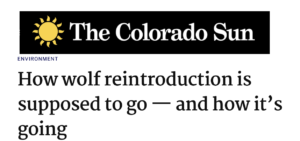
The Aspen Center for Environmental Studies hosted an informative event that centered on coexisting with gray wolves entitled “Living with Wolves – Coexistence in Colorado“.
Joanna served as the Keynote Speaker and her Rocky Mountain Wolf Project colleagues Gary Skiba and Matt Barnes were expert panelists. You can see the entire show here, though the keynote and then the panel start at 7:00 minutes.
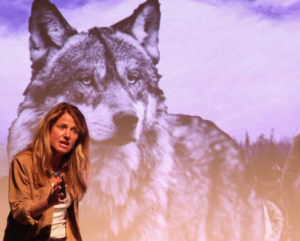
The news story (in the Aspen Times) can be found here
Having gray wolves in working landscapes comes with challenges. Watch this episode of the CBS Sunday Morning Show – “Wolves to be Reintroduced to Colorado” featuring Joanna and rancher Mr. Don Gittleson (March 2023)
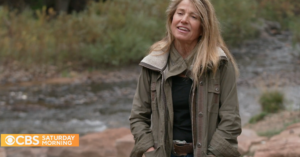
Joanna trekked Everest where she gave the Inaugural Everest Address on Wildlife and Climate – at almost 19,000’ no less!
Read about the adventure here in the The Arts & Science Magazine – “CU Professor treks to top of world to share urgent wildlife and climate message”
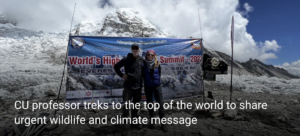
Read this essay that centers on Rewilding the American West (Ripple et al 2022; BioScience) in Outdoor Life – “Scientists Call for Rewilding the West”
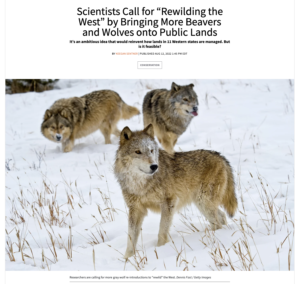
Listen to PhD student Emily Beam, Honors Undergraduate Nicole Schroeder, and Joanna in this episode of The Defenders of Wildlife Defending Wildlife PODCAST: Yellowstone Backcountry: The Search for Coyotes. Hosted by Joanna’s former MS student Kelly Austin Davis.
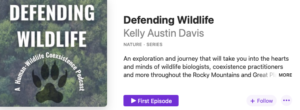
Read Joanna’s inaugural essay in the new newspaper column ColoradoWild: “What Coexisting with Bears Looks Like” (July 2021)
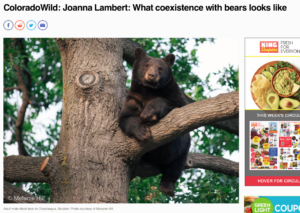
A few thoughts from Joanna in Mongabay News about conservation efforts of mountain gorillas
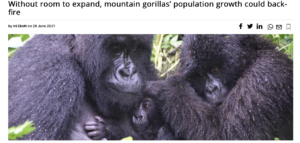
The work in Lambert’s Humans & Wild Animals Lab was recently featured in Wil Stolzenburg’s
“And Still the Song Dog Sings” (May 2021)
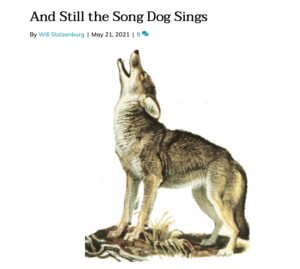
Joanna writes on the sociocultural complexity of gray wolves for the Daily Camera: “Wolves: ReDux“
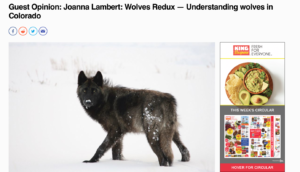
Science Reporter Kelsey Simpkins asks Joanna whether “Will bringing wolves back change Colorado“?
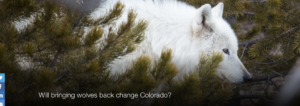
Research press release in Science Daily — a joint effort with Berger Lab
https://www.sciencedaily.com/releases/2020/06/200612172216.htm
Joanna and her lab were recently feature in the Arts & Sciences magazine
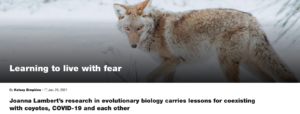
Podcast Episode XII of VetCast –
Wolves: How They Effect Ecosystems and People, a production of the Veterinary Climate Action & Sustainability Talk Series
Hear about Lambert lab research and outreach on the wild canids of the US in this recent CU on the Weekend webinar:
“Coyotes, Wolves, and Why Their Return Matters”
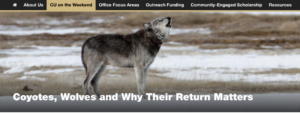
Joanna presents webinar co-sponsored by Project Coyote and the Rewilding Institute
“Fear, Wild Things, and Coexisting with Predators”
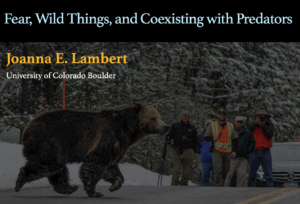
Op Ed Don’t let myths and fear inform your understanding of wolves.
Colorado Public Radio evaluates the significance of wolf puppies in northwest Colorado
But, as Joanna notes, a few puppies does not a population make. Read more here

Notes from the Field: Carnivore Conservation and Coexistence
Interview with Joanna here
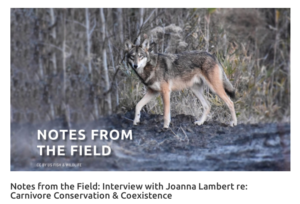
Joanna joins the Science Advisory Board of Project Coyote
Project Coyote is a national non-profit organization based in Northern California whose mission is to promote conservation and coexistence between humans and wildllife through education, science and advocacy. Their vision of the world is one that:
•• Human communities coexist synergistically and peacefully with wildlife;
•• Science empowers lasting solutions for resilient carnivore populations;
•• Native carnivores are valued for their critical ecological role and their intrinsic worth;
•• Children understand the value of Wild Nature;
•• Compassionate conservation drives wildlife stewardship

National Geographic journalist Christine Peterson discusses wolves,
Joanna suggests that if Canis lupus is reintroduced to the western slope of Colorado’s Rocky Mountains, elk will be “leaner, meaner, and healthier.” Read more here

“Ecological grief” is a real thing
As rare animals disappear around the world, being a conservation biologist is increasingly difficult. Read more here
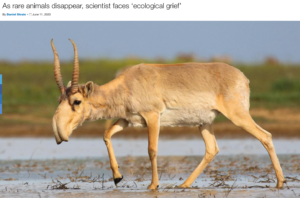
Joanna discusses with CU Boulder Today why wolves howl
Around the world, people are collectively making noise while social distancing. In Colorado, we’re howling like wolves. Joanna discusses with CU Boulder Today why wolves howl, why Coloradans may be howling each night to connect with each other, and how to most accurately join in this nightly chorus. Check out the video: How to Howl Like a Wolf
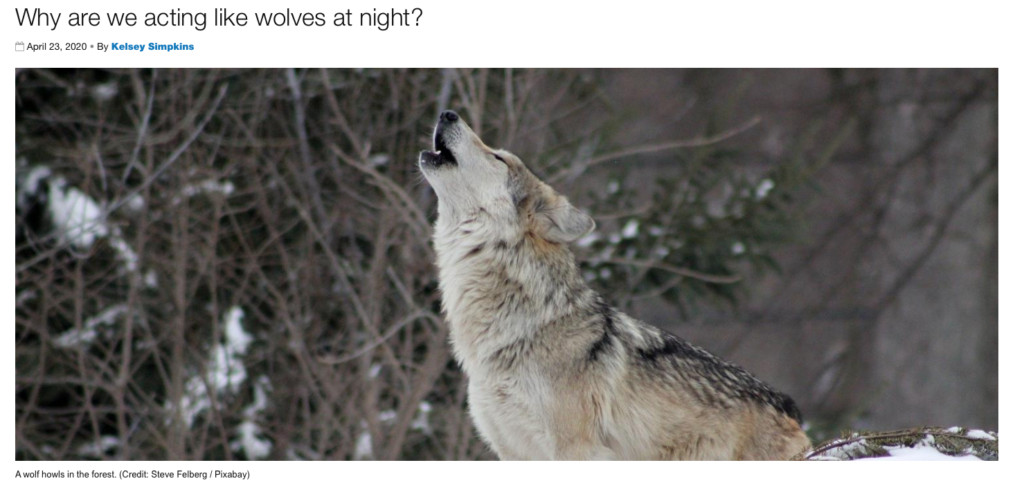
Joanna was recently featured in Popular Science
in an article discussing the wildlife sightings that have been occurring since the COVID-19 crisis: “The real reason we’re seeing more wildlife during the pandemic“
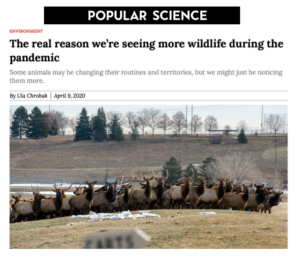
PhD student and lab member, Amanda Ellwanger, receives paper prize
…for her talk: “Foraging in a landscape of fear: charm baboons in the anthropogenic habitats of South Africa” at the AAPA conference (Cleveland, OH)
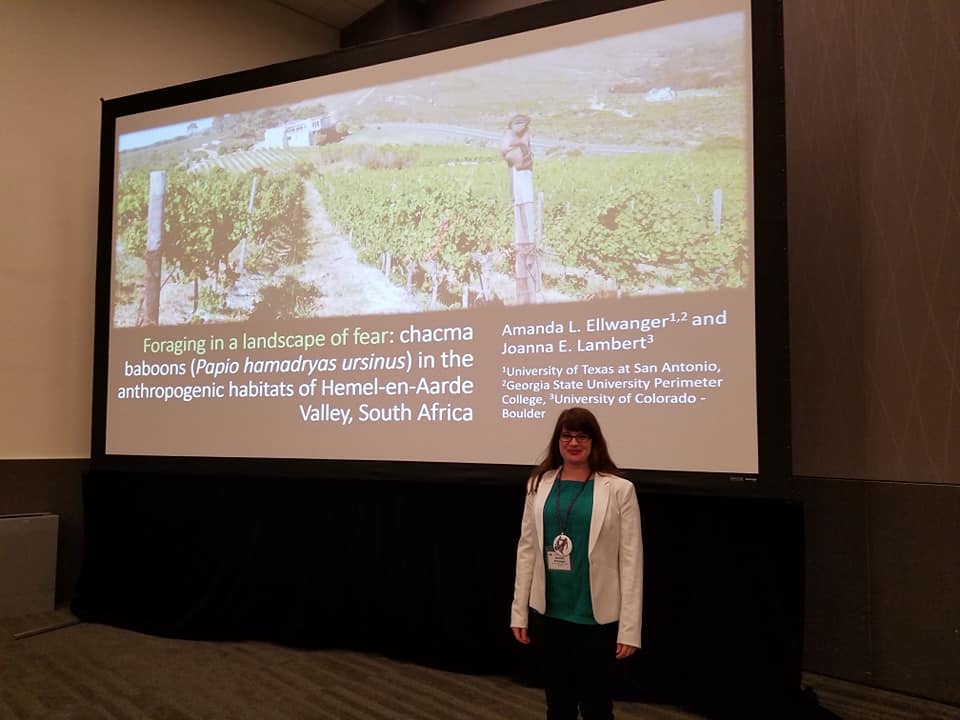
The claim that wolves caused the current COVID-19 pandemic is abjectly false.
Joanna pushes back, with a jab from the Middle Ages: Wolves and pandemics, let’s not get Medieval, The Daily Sentinel 30 March 2019

Watch Joanna and Lab Member Emily Beam on this CBS News show on wolf reintroduction.
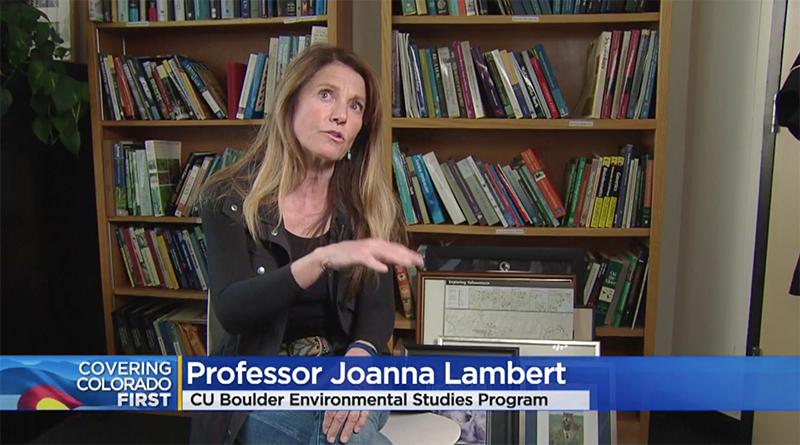
Joanna recently interviewed by The Revelator about ecology and politics of wolf reintroduction
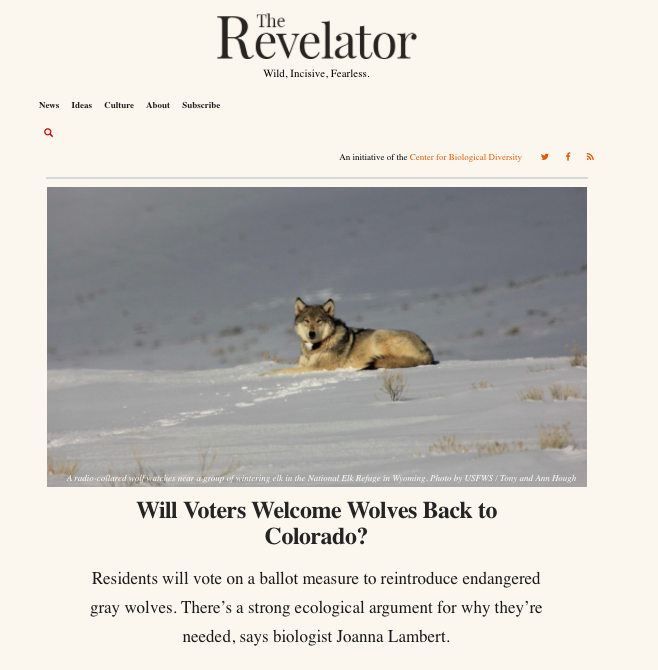
Congratulations to lab member and PhD student Emily Beam
for winning the Best Student Paper at the recent Wildlife Society Conference! Her talk was entitled: “Developing a behavioral profile for urban coyotes: do coyotes ignore people?” This talk centered on the results of her MS thesis research which was conducted in the Greater Denver Metropolitan Area.

Colorado Sun article
Washington Post article
Rocky Mountain Wolf Action Fund: Initiative #107
In her capacity as a scientific advisor to the Rocky Mountain Wolf Project, Joanna recently made a visit to the Secretary of State’s offices at the state capital. There, with colleagues from the Defenders of Wildlife and the Rocky Mountain Wolf Action Fund, she submitted over 211,000 signatures on the Initiative #107 petition to reintroduce gray wolves back to Colorado. This are enough signatures to put #107 onto the 2020 Colorado general election ballot. This legislation instructs Colorado state agency biologists to develop, after public input, a science-based plan for reintroducing wolves into the public lands of western Colorado; if successful, this will represent a major step in restoring an interconnected population of wolves that spans from the high arctic southward to Mexico. If this ballot measure is voted in, it will be the first time that an endangered species will be reintroduced to its former range by a democratic process rather than by the US Fish & Wildlife Services. The submission of these signatures received news attention around the country.
Check out this video clip from CBS news >
Want to learn about the wolves of Yellowstone?
Joanna will be teaching a Yellowstone Institute field seminar there in January 2020 during Wolf Week. There are still a few open spots!! www.yellowstone.org/programs/wolves-dogs-and-humans/
PhD student Emily Beam initiates her research on the behavior and biology of urban-adapted coyotes.
Emily is working with coyotes at 6 sites throughout the greater Denver metropolitan area, addressing questions related to how coyotes cope in heavily urbanized human landscapes (one of her study subjects can be seen below in this camera trap photo). This work was funded by a NEST Fellowship Grant and the University of Colorado Boulder.
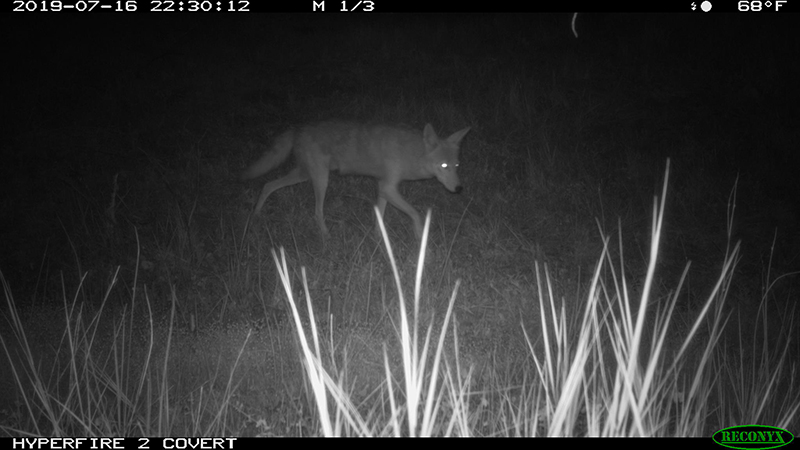
Lab member Melanie Hill in the news upon the launch of her Bears & People Project
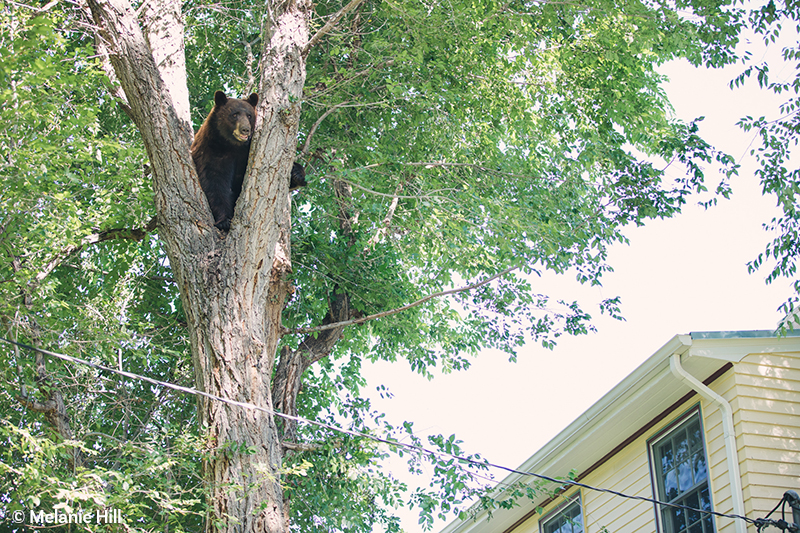
Melanie’s Bears & People Project, a product of her creative-track Master’s thesis, is now live! This project explores how community engagement efforts, collaborative action, and visual storytelling materials may help reduce human-black bear conflicts in Boulder, while also serving as a guide to coexistence for other communities living with these omnivores. Check it out here: www.bearsandpeople.com
And while you’re at it, take a moment to peruse the media coverage of her project:
- Daily Camera: CU Student conducting bear survey as part of master’s thesis
- Center for Humans & Nature: Why Did the Bear Cross the Road?
- Psychology Today interview with Marc Bekoff: Bears and People: A Novel Program For Peaceful Coexistence
- Daily Camera: Survey indicates support of black bears in Boulder
- Denver Post: Boulder just fine with being black bear country, survey says
- Sierra Magazine: Better Living With Bears
Lambert speaks at Boulder Environmental Film Festival
https://www.boulderenoff.org/november-10th-program
Joanna was the inaugural Scientist-in-Residence through the Yellowstone Forever Institute!
This program was made possible through the generous efforts of world-famous cinematographer Bob Landis. Bob’s gift to Yellowstone Forever provides scholars an unparalleled opportunity to live and work in Yellowstone country. Learn more here >
Research initiated in Yellowstone National Park
This summer Joanna initiated research on coyote feeding biology in Yellowstone National Park. This is the first phase of a larger research project entitled Detecting signals of rapid evolution and self-domestication: noninvasive testing of bottom up and top down effects on coyote genetics and physiology. This research is being carried out with coPIs Stewart Breck (USDA), Chris Schell (UW Tacoma), and PJ Perry (Penn State), along with PhD student Emily Beam.
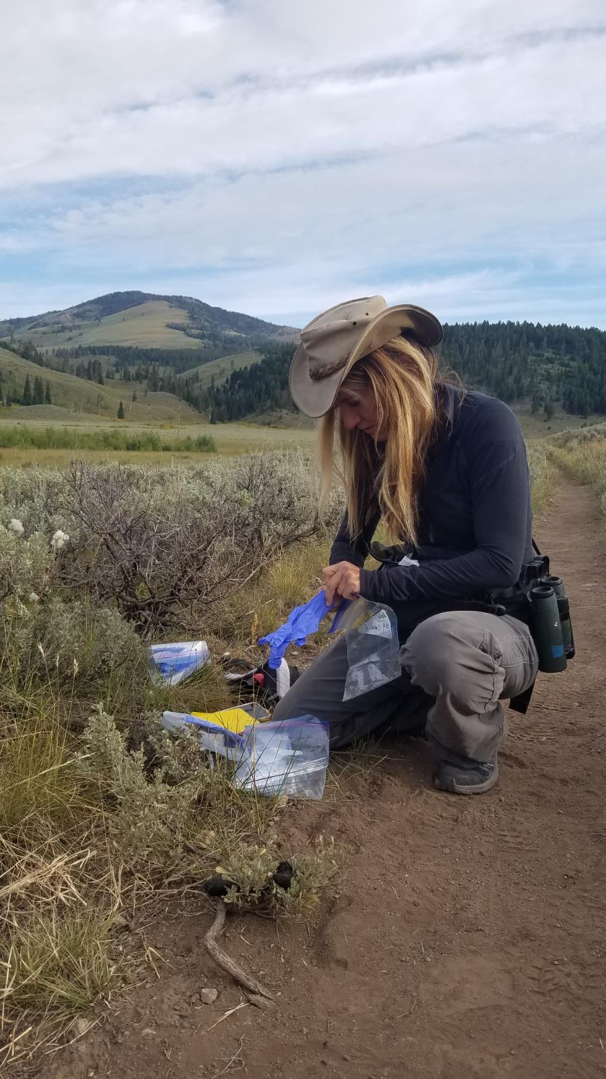
Watch Joanna in Episode 1 (Wolves Become Dogs)
of the 2019 DVD Dogs on the Job, a 7-part documentary series produced by Millcreek Entertainment LLC. The video is available here.
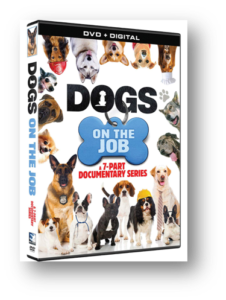
Check out Joanna’s lecture in Colorado State University’s Human-Wildlife Colloquia Series.
This invited series is a collaboration between the Department of Fish, Wildlife and Conservation Biology and the Department of the Human Dimensions of Natural Resources. https://www.youtube.com/watch?v=HCbtbDbgPkE
Joanna’s OpEd in The Daily Sentinel
Wolves never fail to stir emotions, positive or not. Let the people of Colorado decide. https://www.gjsentinel.com/opinion/columns/wolves-never-fail-to-stir-emotions-positive-or-not-let/article_75e0a314-a192-11e9-a636-20677ce85d90.html
PhD Candidate and Lab Member Amanda Ellwanger presents at the Pathways: Human Dimensions of Wildlife Conference in Estes Park, CO (September 2019)
https://sites.warnercnr.colostate.edu/pathways/ Her paper (abstract below) was really well received!
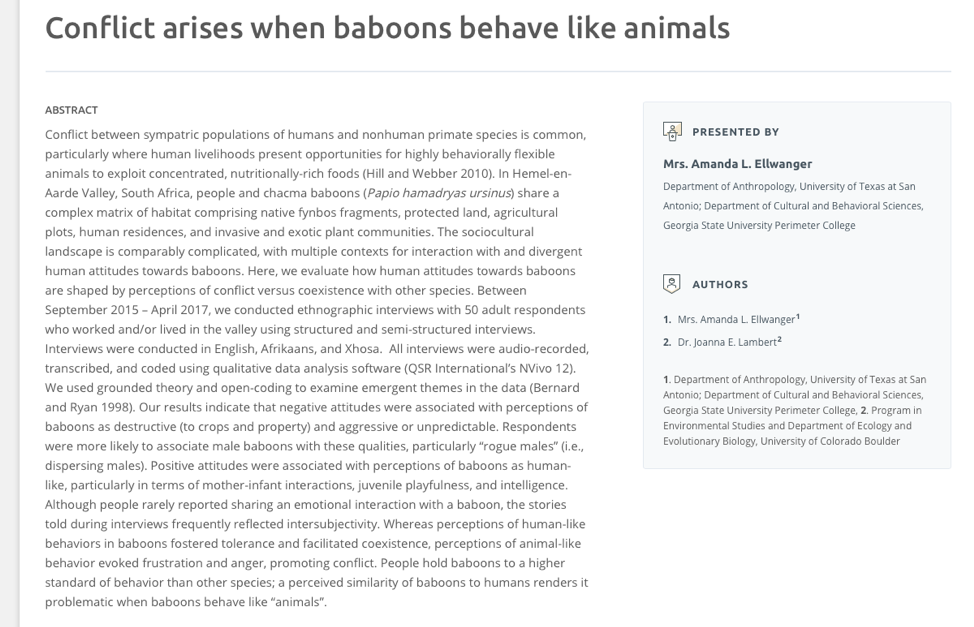
Honors Undergraduate and Lab Member Zachary Schwartz
has been elected as the inaugural President of the newly formed University of Colorado Boulder Wildlife Club. Go Zach! Lab Member and Director of Outreach, Melanie Hill established the club in 2017 after many months of hard work. See the write up here: https://www.colorado.edu/today/2019/02/26/cus-newest-student-club-fosters-enthusiasm-local-fauna
Joanna’s class Dogs, Wolves, and Human Evolution
named one of University of Colorado Top Ten Must-Take Classes! (https://oneclass.com/blog/university-of-colorado-boulder/3147-10-must-take-courses-at-cu-boulder.en.html )
Lambert Lab Postdoctoral Fellowship
Are you interested in applying for a postdoctoral fellowship to work in the Lambert Lab at the University of Colorado? Please contact us!
January 2017 coverage in the New York Times
Read about Joanna and her collaborator’s research on species extinction in the New York Times
January 2017 coverage in the Daily Camera
Joanna in the Colorado Arts & Sciences Magazine, May 2017
The first question in conservation is whether to focus on conserving species or habitat. Anthropologist Joanna Lambert has proposed conservation tactics that focus on particular primate species. Read more here.
The Kibale Primates & Plants Project (KPPP) has a new Project Manager
Project Manager, Richard Mutegeki, seen here with Joanna at the Makerere Biological Field Station in Kibale National Park, Uganda. Richard has a BSc in Environmental Science and Diploma in Forestry from Makerere University and manages all data collection in the field. We are very lucky to have him working with the project!

Induction as a Fellow into the Linnean Society of London
In 2015 Joanna Lambert was inducted as a Fellow into the Linnean Society of London (established 1788) (see photo below with Linnean Society President, Professor Dianne Edwards CBE, after signing the charter). The Linnean Society is the world’s oldest active society dedicated to natural history, named after Swedish naturalist Carl Linnaeus (1707–1778) whose botanical, zoological and library collections have been in its keeping since 1829. Charles Darwin and Alfred Russel Wallace first proposed the theory of Natural Selection in their joint paper at the Linnean Society in 1858 http://www.linnean.org
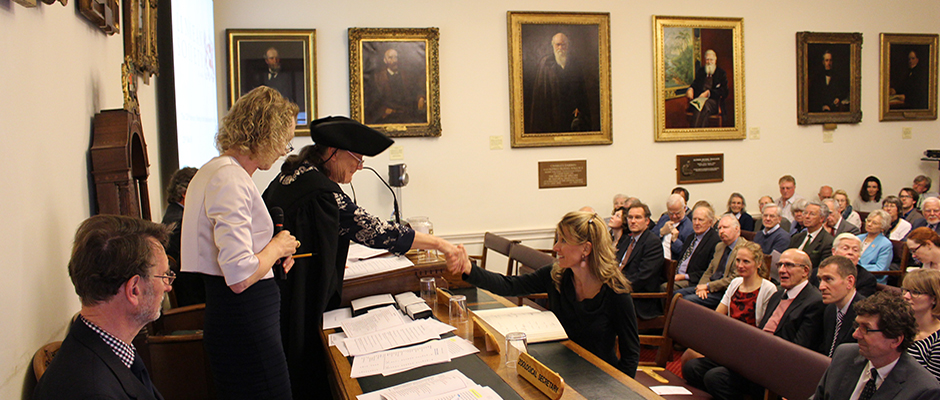
University of Texas President’s Award for Distinguished Research
In 2015, while Joanna was still at the University of Texas – San Antonio, she was awarded the University of Texas President’s Award for Distinguished Research. This award is to recognize, encourage and reward faculty who have conducted a sustained program of high-quality, high-impact research that has translated into national and international recognition and has made a substantial contribution to the faculty member’s field.
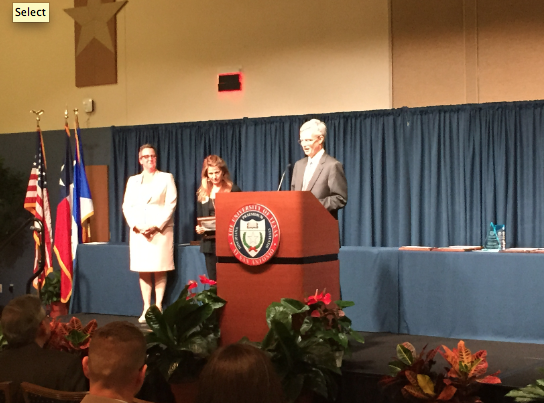
Elected as Fellow of the American Association for the Advancement of Sciences
Joanna Lambert is an elected Fellow of the American Association for the Advancement of Sciences, and in that capacity has just been elected (November 2014) as Steering Committee Member-at-Large of Section H (Anthropology) http://www.aaas.org/annual-election-aaas-officers
2014 Distinguished Alumni Award from Northern Illinois University
Joanna Lambert received the 2014 Distinguished Alumni Award from Northern Illinois University. Joanna received her B.S. (Anthropology and Biology) and M.S. (Biological Anthropology) from NIU before continuing her PhD work at the University of Illinois at Urbana-Champaign (Biological Anthropology) and her postdoctoral fellowship at the University of Florida (Zoology). See link for more information: http://www.niu.edu/clas/awards/awards_2014/honorees/lambert.shtml
Lab member Jenna Bonavia awarded a National Science Foundation grant
Lab member Jenna Bonavia was recently awarded a National Science Foundation Graduate Research Fellowship Grant (GRF2013163897 | Advisor/coPI JE Lambert) amounting to $132,000 for her research on Climate Change and its Implications for Plant Nutrient Content and Primate Diet (2013 – 2018). She is working with Joanna in Kibale National Park, Uganda http://www.nsfgrfp.org
Lab member Martha Lyke publication in Molecular Ecology
Lab member Martha Lyke published “A molecular analysis of African lion mating structure and extra-group paternity in Etosha National Park” in the journal Molecular Ecology (2013) 22(10):2787-96. Within a day, it was written up in the New Scientist! Check it out: http://www.newscientist.com/article/dn23304-zoologger-the-changing-face-of-the-lion.html?full=true&print=true#.VEUMZxbN_A4
“Ecological grief” is a real thing, read more here
As rare animals disappear around the world, being a conservation biologist is increasingly difficult
Joanna discusses with CU Boulder Today why wolves howl
Around the world, people are collectively making noise while social distancing. In Colorado, we’re howling like wolves. Joanna discusses with CU Boulder Today why wolves howl, why Coloradans may be howling each night to connect with each other, and how to most accurately join in this nightly chorus. Check out the video: How to Howl Like a Wolf

Joanna was recently featured in Popular Science
in an article discussing the wildlife sightings that have been occurring since the COVID-19 crisis: “The real reason we’re seeing more wildlife during the pandemic“

PhD student and lab member, Amanda Ellwanger, receives paper prize
…for her talk: “Foraging in a landscape of fear: charm baboons in the anthropogenic habitats of South Africa” at the AAPA conference (Cleveland, OH)

The claim that wolves caused the current COVID-19 pandemic is abjectly false.
Joanna pushes back, with a jab from the Middle Ages: Wolves and pandemics, let’s not get Medieval, The Daily Sentinel 30 March 2019

Watch Joanna and Lab Member Emily Beam on this CBS News show on wolf reintroduction.

Joanna recently interviewed by The Revelator about ecology and politics of wolf reintroduction

Congratulations to lab member and PhD student Emily Beam
for winning the Best Student Paper at the recent Wildlife Society Conference! Her talk was entitled: “Developing a behavioral profile for urban coyotes: do coyotes ignore people?” This talk centered on the results of her MS thesis research which was conducted in the Greater Denver Metropolitan Area.

Colorado Sun article
Washington Post article
Rocky Mountain Wolf Action Fund: Initiative #107
In her capacity as a scientific advisor to the Rocky Mountain Wolf Project, Joanna recently made a visit to the Secretary of State’s offices at the state capital. There, with colleagues from the Defenders of Wildlife and the Rocky Mountain Wolf Action Fund, she submitted over 211,000 signatures on the Initiative #107 petition to reintroduce gray wolves back to Colorado. This are enough signatures to put #107 onto the 2020 Colorado general election ballot. This legislation instructs Colorado state agency biologists to develop, after public input, a science-based plan for reintroducing wolves into the public lands of western Colorado; if successful, this will represent a major step in restoring an interconnected population of wolves that spans from the high arctic southward to Mexico. If this ballot measure is voted in, it will be the first time that an endangered species will be reintroduced to its former range by a democratic process rather than by the US Fish & Wildlife Services. The submission of these signatures received news attention around the country.
Check out this video clip from CBS news >
Want to learn about the wolves of Yellowstone?
Joanna will be teaching a Yellowstone Institute field seminar there in January 2020 during Wolf Week. There are still a few open spots!! www.yellowstone.org/programs/wolves-dogs-and-humans/
PhD student Emily Beam initiates her research on the behavior and biology of urban-adapted coyotes.
Emily is working with coyotes at 6 sites throughout the greater Denver metropolitan area, addressing questions related to how coyotes cope in heavily urbanized human landscapes (one of her study subjects can be seen below in this camera trap photo). This work was funded by a NEST Fellowship Grant and the University of Colorado Boulder.

Lab member Melanie Hill in the news upon the launch of her Bears & People Project

Melanie’s Bears & People Project, a product of her creative-track Master’s thesis, is now live! This project explores how community engagement efforts, collaborative action, and visual storytelling materials may help reduce human-black bear conflicts in Boulder, while also serving as a guide to coexistence for other communities living with these omnivores. Check it out here: www.bearsandpeople.com
And while you’re at it, take a moment to peruse the media coverage of her project:
- Daily Camera: CU Student conducting bear survey as part of master’s thesis
- Center for Humans & Nature: Why Did the Bear Cross the Road?
- Psychology Today interview with Marc Bekoff: Bears and People: A Novel Program For Peaceful Coexistence
- Daily Camera: Survey indicates support of black bears in Boulder
- Denver Post: Boulder just fine with being black bear country, survey says
- Sierra Magazine: Better Living With Bears
Lambert speaks at Boulder Environmental Film Festival
https://www.boulderenoff.org/november-10th-program
Joanna was the inaugural Scientist-in-Residence through the Yellowstone Forever Institute!
This program was made possible through the generous efforts of world-famous cinematographer Bob Landis. Bob’s gift to Yellowstone Forever provides scholars an unparalleled opportunity to live and work in Yellowstone country. Learn more here >
Research initiated in Yellowstone National Park
This summer Joanna initiated research on coyote feeding biology in Yellowstone National Park. This is the first phase of a larger research project entitled Detecting signals of rapid evolution and self-domestication: noninvasive testing of bottom up and top down effects on coyote genetics and physiology. This research is being carried out with coPIs Stewart Breck (USDA), Chris Schell (UW Tacoma), and PJ Perry (Penn State), along with PhD student Emily Beam.

Watch Joanna in Episode 1 (Wolves Become Dogs)
of the 2019 DVD Dogs on the Job, a 7-part documentary series produced by Millcreek Entertainment LLC. The video is available here.

Check out Joanna’s lecture in Colorado State University’s Human-Wildlife Colloquia Series.
This invited series is a collaboration between the Department of Fish, Wildlife and Conservation Biology and the Department of the Human Dimensions of Natural Resources. https://www.youtube.com/watch?v=HCbtbDbgPkE
Joanna’s OpEd in The Daily Sentinel
Wolves never fail to stir emotions, positive or not. Let the people of Colorado decide. https://www.gjsentinel.com/opinion/columns/wolves-never-fail-to-stir-emotions-positive-or-not-let/article_75e0a314-a192-11e9-a636-20677ce85d90.html
PhD Candidate and Lab Member Amanda Ellwanger presents at the Pathways: Human Dimensions of Wildlife Conference in Estes Park, CO (September 2019)
https://sites.warnercnr.colostate.edu/pathways/ Her paper (abstract below) was really well received!

Honors Undergraduate and Lab Member Zachary Schwartz
has been elected as the inaugural President of the newly formed University of Colorado Boulder Wildlife Club. Go Zach! Lab Member and Director of Outreach, Melanie Hill established the club in 2017 after many months of hard work. See the write up here: https://www.colorado.edu/today/2019/02/26/cus-newest-student-club-fosters-enthusiasm-local-fauna
Joanna’s class Dogs, Wolves, and Human Evolution
named one of University of Colorado Top Ten Must-Take Classes! (https://oneclass.com/blog/university-of-colorado-boulder/3147-10-must-take-courses-at-cu-boulder.en.html )
Lambert Lab Postdoctoral Fellowship
Are you interested in applying for a postdoctoral fellowship to work in the Lambert Lab at the University of Colorado? Please contact us!
January 2017 coverage in the New York Times
Read about Joanna and her collaborator’s research on species extinction in the New York Times
January 2017 coverage in the Daily Camera
Joanna in the Colorado Arts & Sciences Magazine, May 2017
The first question in conservation is whether to focus on conserving species or habitat. Anthropologist Joanna Lambert has proposed conservation tactics that focus on particular primate species. Read more here.
The Kibale Primates & Plants Project (KPPP) has a new Project Manager
Project Manager, Richard Mutegeki, seen here with Joanna at the Makerere Biological Field Station in Kibale National Park, Uganda. Richard has a BSc in Environmental Science and Diploma in Forestry from Makerere University and manages all data collection in the field. We are very lucky to have him working with the project!

Induction as a Fellow into the Linnean Society of London
In 2015 Joanna Lambert was inducted as a Fellow into the Linnean Society of London (established 1788) (see photo below with Linnean Society President, Professor Dianne Edwards CBE, after signing the charter). The Linnean Society is the world’s oldest active society dedicated to natural history, named after Swedish naturalist Carl Linnaeus (1707–1778) whose botanical, zoological and library collections have been in its keeping since 1829. Charles Darwin and Alfred Russel Wallace first proposed the theory of Natural Selection in their joint paper at the Linnean Society in 1858 http://www.linnean.org

University of Texas President’s Award for Distinguished Research
In 2015, while Joanna was still at the University of Texas – San Antonio, she was awarded the University of Texas President’s Award for Distinguished Research. This award is to recognize, encourage and reward faculty who have conducted a sustained program of high-quality, high-impact research that has translated into national and international recognition and has made a substantial contribution to the faculty member’s field.

Elected as Fellow of the American Association for the Advancement of Sciences
Joanna Lambert is an elected Fellow of the American Association for the Advancement of Sciences, and in that capacity has just been elected (November 2014) as Steering Committee Member-at-Large of Section H (Anthropology) http://www.aaas.org/annual-election-aaas-officers
2014 Distinguished Alumni Award from Northern Illinois University
Joanna Lambert received the 2014 Distinguished Alumni Award from Northern Illinois University. Joanna received her B.S. (Anthropology and Biology) and M.S. (Biological Anthropology) from NIU before continuing her PhD work at the University of Illinois at Urbana-Champaign (Biological Anthropology) and her postdoctoral fellowship at the University of Florida (Zoology). See link for more information: http://www.niu.edu/clas/awards/awards_2014/honorees/lambert.shtml
Lab member Jenna Bonavia awarded a National Science Foundation grant
Lab member Jenna Bonavia was recently awarded a National Science Foundation Graduate Research Fellowship Grant (GRF2013163897 | Advisor/coPI JE Lambert) amounting to $132,000 for her research on Climate Change and its Implications for Plant Nutrient Content and Primate Diet (2013 – 2018). She is working with Joanna in Kibale National Park, Uganda http://www.nsfgrfp.org
Lab member Martha Lyke publication in Molecular Ecology
Lab member Martha Lyke published “A molecular analysis of African lion mating structure and extra-group paternity in Etosha National Park” in the journal Molecular Ecology (2013) 22(10):2787-96. Within a day, it was written up in the New Scientist! Check it out: http://www.newscientist.com/article/dn23304-zoologger-the-changing-face-of-the-lion.html?full=true&print=true#.VEUMZxbN_A4
